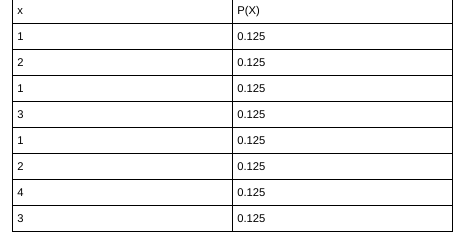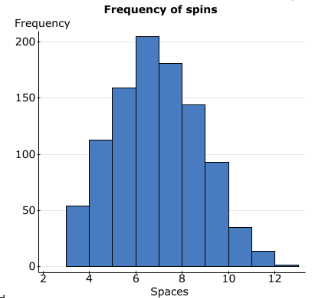
Concept explainers
I don't understand whether he wants the theoretical


Trending nowThis is a popular solution!
Step by stepSolved in 2 steps with 1 images

- Consider the situation that two events A and B are independent. P(A) = 0.2 and P(B)= 0.5. What is the probability that both events A and B occur?arrow_forwardThe probability of afternoon rain given morning cloud cover >50% is of interest to those forecasting the weather. You can calculate this probability using Bayes' Theorem (below). The probability of morning cloud cover in general is 30% in the area you are concerned with and when there's afternoon rain, morning cloud cover of the kind described above occurs 90% of the time. The probability of rain in general for the area is about 26% of days. From the above information, identify what P(BIA) would be. Express your answer as a proportion, rounded to two decimal places. P(A/B)= = P(B|A)*P(A) P(B)arrow_forwardQUESTION 2 a) Based on the past data, 8% of customers will order a dessert with the meal at a noodle's restaurant. 14% of them will order a bottled beverage. i. What is the probability that a customer will order both a dessert and a bottled average? (2 marks) ii. The customers have ordered a dessert with the meal. Calculate the probability that he or she will order a bottled beverage. (2 marks) b) The Graduate Management Admission Test (GMAT) is a requirement for all applicants of MBA programs. A variety of preparatory courses are designed to help applicants improve their GMAT scores, which range from 200 to 800. Suppose that a survey of MBA students reveals that among GMAT scorers at least 650, 72% took a preparatory course; whereas among GMAT scores of less than 650 only 31% took a preparatory course. The probability for an applicant to score at least 650 is 30%. Suppose he was not taking the preparatory course. What is his probability of achieving 650 or more for GMAT score? (5…arrow_forward
- At races, your horse, White Rum, has a probability of 1/20 of coming 1st, 1/10 of coming 2nd and a probability of ¼ in coming 3rd. First place pays $5,000 to the winner, second place $4,000 and third place $1,350. Hence, is it worth entering the race if it costs $1050?arrow_forwardYour friend Phil, asks you what you think about a new scratch-off lottery game. It costs $10 to play this game, There are two outcomes for the game (win, lose) and the probability that a player wins a game is 60%. A win results in $15, for a net win of $5 ($15 minus the $10 paid to play). The probability distribution for x� (the amount of money a player wins or loses) in a single game is as follows:arrow_forwardHi! I pretty much don't understand this problem that was presented on my Statistics classarrow_forward
- Thank you. I'm not sure about the result for the second question. What I'm having a hard time with is the probability that a total of 30 of the 546 crashes have occurred in the 48 time windows. My data shows that crashes occurred in 25 of these 48 time windows, with 3 in one of these and 2 in three others.arrow_forwardAt her archery lessons, Tess has a 90% chance of getting a bull's eye. Unfortunately, there is only a 40% chance that her instructor will be watching her when she shoots. What is the probability that her instructor will see Tess hit the bull's eye? Explain completely.arrow_forward
 MATLAB: An Introduction with ApplicationsStatisticsISBN:9781119256830Author:Amos GilatPublisher:John Wiley & Sons Inc
MATLAB: An Introduction with ApplicationsStatisticsISBN:9781119256830Author:Amos GilatPublisher:John Wiley & Sons Inc Probability and Statistics for Engineering and th...StatisticsISBN:9781305251809Author:Jay L. DevorePublisher:Cengage Learning
Probability and Statistics for Engineering and th...StatisticsISBN:9781305251809Author:Jay L. DevorePublisher:Cengage Learning Statistics for The Behavioral Sciences (MindTap C...StatisticsISBN:9781305504912Author:Frederick J Gravetter, Larry B. WallnauPublisher:Cengage Learning
Statistics for The Behavioral Sciences (MindTap C...StatisticsISBN:9781305504912Author:Frederick J Gravetter, Larry B. WallnauPublisher:Cengage Learning Elementary Statistics: Picturing the World (7th E...StatisticsISBN:9780134683416Author:Ron Larson, Betsy FarberPublisher:PEARSON
Elementary Statistics: Picturing the World (7th E...StatisticsISBN:9780134683416Author:Ron Larson, Betsy FarberPublisher:PEARSON The Basic Practice of StatisticsStatisticsISBN:9781319042578Author:David S. Moore, William I. Notz, Michael A. FlignerPublisher:W. H. Freeman
The Basic Practice of StatisticsStatisticsISBN:9781319042578Author:David S. Moore, William I. Notz, Michael A. FlignerPublisher:W. H. Freeman Introduction to the Practice of StatisticsStatisticsISBN:9781319013387Author:David S. Moore, George P. McCabe, Bruce A. CraigPublisher:W. H. Freeman
Introduction to the Practice of StatisticsStatisticsISBN:9781319013387Author:David S. Moore, George P. McCabe, Bruce A. CraigPublisher:W. H. Freeman





